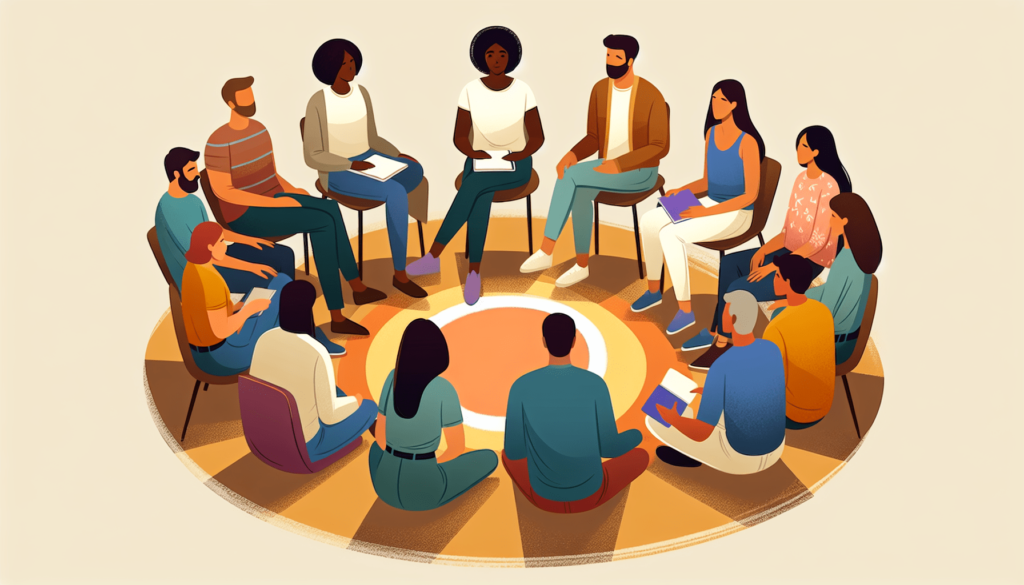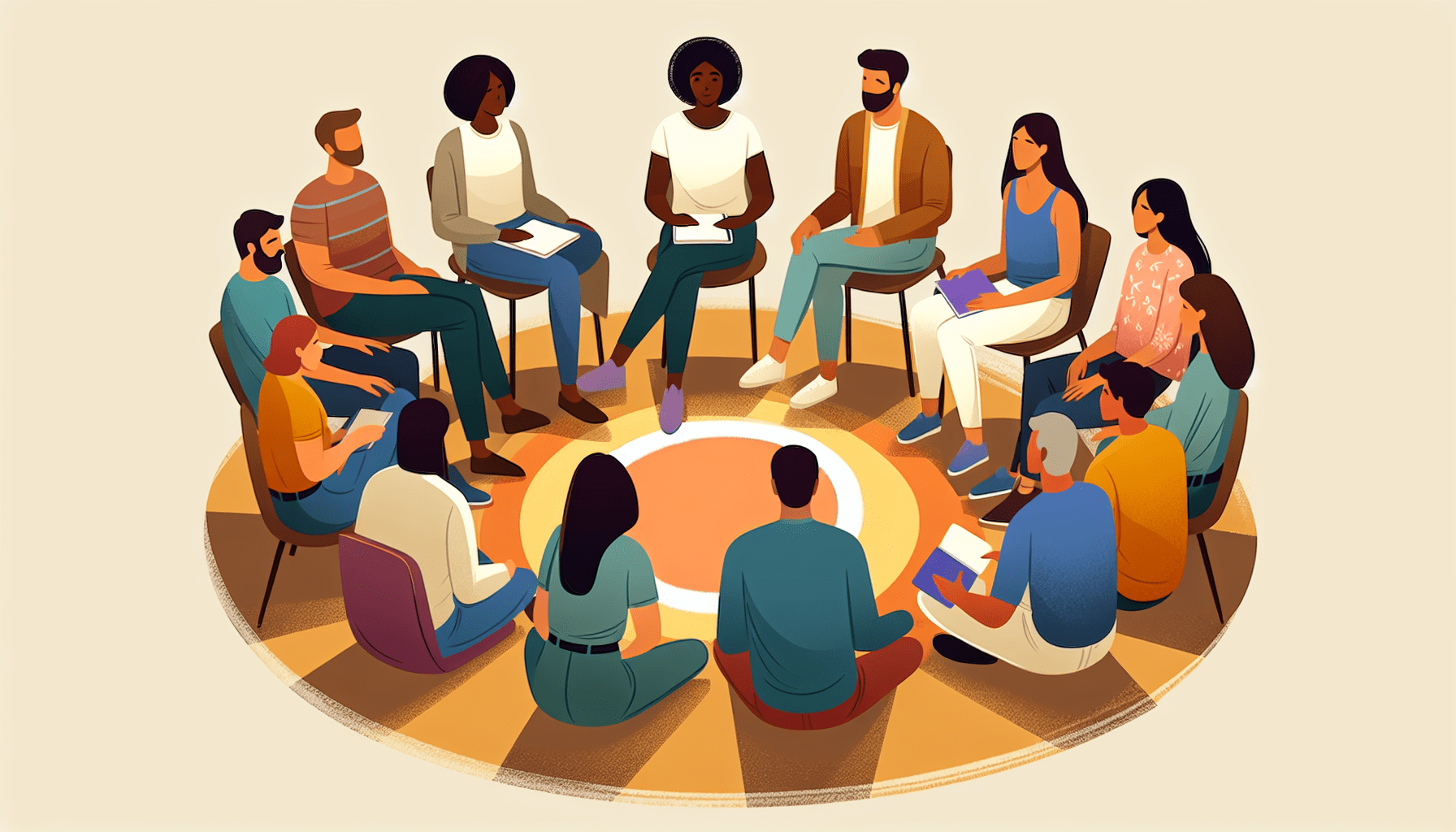Welcome to an exploration of the vital role that community plays in the journey towards holistic healing. In this article, we will discuss how the support, understanding, and connection found within a community can greatly enhance your overall well-being. From offering emotional support to providing opportunities for growth and learning, the power of community in holistic healing is truly profound. Let’s dive in and discover the transformative impact that community can have on your healing journey. Have you ever wondered why community plays such a vital role in holistic healing? Let’s dive into the importance of community in promoting overall wellness and well-being.
What is Holistic Healing?
Holistic healing focuses on treating the whole person – mind, body, and spirit – rather than just the symptoms of a specific ailment. It takes into account all aspects of an individual’s life, including their physical, emotional, and spiritual well-being. By addressing the root cause of an issue and considering the interconnectedness of all aspects of health, holistic healing aims to achieve balance and harmony within the individual.
Holistic Healing vs. Traditional Medicine
Holistic healing approaches health and wellness from a different perspective than traditional medicine. While traditional medicine tends to focus on treating specific symptoms or diseases with medication or surgery, holistic healing looks at the bigger picture and seeks to address underlying imbalances in the body. By treating the whole person, holistic healing aims to promote long-term health and well-being rather than just temporary relief of symptoms.
The Power of Community in Holistic Healing
Community plays a crucial role in supporting holistic healing practices. Whether it’s through group therapy sessions, support groups, or simply having a network of friends and family to lean on, community can provide a sense of belonging, connection, and support that is essential for overall well-being.
Finding Like-minded Individuals
Being part of a community of like-minded individuals who share similar beliefs and values can be incredibly empowering. It creates a sense of unity and solidarity, knowing that you are not alone in your journey towards holistic healing. Surrounding yourself with people who understand and support your goals can help you stay motivated and committed to your wellness practices.
Sharing Knowledge and Resources
Communities provide a wealth of knowledge and resources that can help individuals on their holistic healing journey. Whether it’s sharing information about new healing modalities, recommending practitioners, or providing guidance on healthy living practices, being part of a community can enrich and enhance your wellness journey. By pooling together collective wisdom and experiences, individuals can learn from each other and discover new ways to promote their overall health and well-being.
Emotional Support and Encouragement
One of the most significant benefits of community in holistic healing is the emotional support and encouragement it provides. Dealing with health challenges or making significant lifestyle changes can be overwhelming at times, and having a supportive community can make a world of difference. Being able to share your struggles, triumphs, and progress with others who understand and empathize can boost your morale and confidence, making it easier to stay on track with your healing journey.

Building a Supportive Community for Holistic Healing
Creating a supportive community for holistic healing involves building relationships, fostering open communication, and establishing a network of like-minded individuals who share a common goal of promoting health and well-being. Here are some tips on how to build a strong and supportive community for holistic healing:
Establishing Trust and Connection
Building trust and connection within a community is essential for fostering a sense of belonging and support. By creating a safe and welcoming environment where individuals feel heard, respected, and valued, you can encourage open communication and authentic relationships to flourish. Trust is the foundation of any community, and it is vital for creating a space where individuals can feel comfortable sharing their experiences, struggles, and victories without fear of judgment or criticism.
Encouraging Active Participation
Encouraging active participation within a community can help foster a sense of engagement, ownership, and empowerment among members. By providing opportunities for individuals to contribute their ideas, knowledge, and skills, you can create a collaborative and dynamic community that thrives on shared participation and involvement. From organizing workshops, events, and meetings to facilitating discussions and group activities, involving members in the community’s decision-making process can help create a sense of ownership and investment in the group’s collective well-being.
Providing Support and Resources
Creating a supportive community also involves providing resources, tools, and information that can help individuals on their holistic healing journey. Whether it’s offering access to expert practitioners, organizing educational sessions, or sharing relevant articles, books, and resources, providing support in various forms can enrich and enhance the community’s overall experience. By equipping members with the knowledge and tools they need to support their health and well-being, you can empower them to take an active role in their healing process and cultivate a culture of self-care and wellness within the community.
Cultivating a Culture of Empathy and Compassion
Promoting empathy and compassion within a community is vital for creating a supportive and nurturing environment where individuals feel understood, accepted, and cared for. By practicing active listening, empathy, and kindness towards one another, you can foster a culture of compassion and understanding that encourages individuals to express themselves authentically and openly. Empathy allows individuals to connect on a deeper level, share in each other’s joys and sorrows, and provide emotional support when needed. By cultivating a culture of empathy and compassion, you can create a warm and inviting community where individuals feel safe, supported, and respected.
The Role of Community in Mental Health and Wellness
Community plays a significant role in promoting mental health and wellness by providing social connection, emotional support, and a sense of belonging that are essential for overall well-being. In the context of holistic healing, community can act as a powerful catalyst for healing and transformation, offering a space for individuals to share their experiences, learn from others, and grow together in their journey towards health and wellness.
Social Connection and Support
Social connection is a fundamental human need that plays a critical role in promoting mental health and well-being. Having a strong support network of friends, family, and community members can provide a sense of belonging, connection, and social support that is essential for mental and emotional health. Feeling connected to others and knowing that you are not alone in your struggles can help reduce feelings of isolation, loneliness, and depression, while fostering a sense of companionship, understanding, and camaraderie.
Emotional Support and Validation
Community can also provide emotional support and validation that can help individuals cope with stress, anxiety, and other mental health challenges. By having a safe space to express their feelings, share their experiences, and receive empathy and understanding from others, individuals can experience a sense of validation, acceptance, and comfort that can be incredibly healing and supportive. Building relationships with people who understand and support you can boost your self-esteem, confidence, and resilience, making it easier to navigate life’s challenges and setbacks.
Peer Support and Shared Experiences
Peer support is a powerful tool for promoting mental health and wellness, as it allows individuals to connect with others who have similar experiences, struggles, and goals. By sharing their stories, insights, and strategies for coping with mental health challenges, individuals can learn from each other, gain valuable perspective, and discover new ways to support their well-being. Peer support groups, forums, and networks can provide a space for individuals to connect with others who understand their struggles and offer hope, encouragement, and practical advice for navigating their mental health journey.

Integrating Holistic Healing Practices into Community Settings
Integrating holistic healing practices into community settings can help promote health and wellness among members, foster a sense of unity and connection, and create a supportive environment for individuals to heal and grow. By incorporating holistic healing approaches into community-based programs, activities, and initiatives, you can empower individuals to take an active role in their well-being, promote self-care and wellness, and create a culture of health and healing within the community.
Wellness Workshops and Events
Organizing wellness workshops, events, and activities within the community can provide valuable information, skills, and resources that can help individuals improve their health and well-being. From yoga and meditation classes to nutrition workshops and stress management sessions, offering a variety of wellness programs can empower individuals to take charge of their health, learn new self-care practices, and connect with others who share a similar interest in holistic healing. By hosting wellness events that cater to the diverse needs and interests of community members, you can create a supportive and inclusive environment that promotes health and wellness for all.
Support Groups and Peer Counseling
Establishing support groups and peer counseling programs within the community can provide a space for individuals to connect with others who share similar experiences, struggles, and goals. Whether it’s a group for individuals dealing with chronic pain, mental health challenges, or life transitions, support groups can offer a sense of belonging, understanding, and camaraderie that is essential for healing and growth. By providing peer support and counseling opportunities, community members can receive emotional support, practical advice, and empowerment from others who have walked a similar path, helping them feel less alone, more understood, and better equipped to navigate their challenges.
Community Gardens and Outdoor Spaces
Creating community gardens and outdoor spaces can provide a therapeutic and healing environment for individuals to connect with nature, practice mindfulness, and cultivate their well-being. Gardening has been shown to have numerous health benefits, including reducing stress, improving mental health, and fostering a sense of connection to the earth and community. By establishing community gardens where members can grow their food, connect with the land, and engage in physical activity, you can promote health, sustainability, and community bonding within the group. Outdoor spaces also provide opportunities for relaxation, reflection, and rejuvenation, allowing individuals to recharge, relax, and find peace in nature.
Holistic Health Fairs and Expos
Hosting holistic health fairs and expos within the community can offer a space for individuals to explore different healing modalities, therapies, and practices that promote health and well-being. From acupuncture and massage therapy to energy healing and aromatherapy, holistic health fairs can provide a platform for practitioners to showcase their services, educate the community about holistic healing approaches, and connect individuals with resources and support that can enhance their wellness journey. By bringing together holistic healers, practitioners, and wellness experts in one place, you can create a hub of knowledge, inspiration, and empowerment that promotes health and healing for the entire community.
Conclusion
Community plays a vital role in holistic healing by providing social connection, emotional support, and a sense of belonging that are essential for overall well-being. By being part of a supportive community, individuals can find encouragement, inspiration, and resources that can help them on their healing journey and promote health and wellness in all aspects of their lives. Whether it’s through sharing knowledge, experiences, or simply being there for one another, community can act as a powerful catalyst for transformation, healing, and growth. So, embrace the power of community in holistic healing and discover the profound impact it can have on your well-being.

